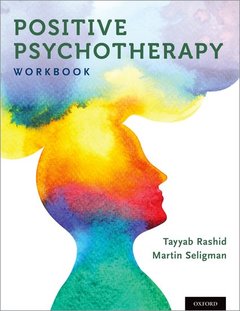Description
Positive Psychotherapy
Workbook
Authors: Rashid Tayyab, Seligman Martin
Language: English
Subject for Positive Psychotherapy:
Publication date: 02-2019
208 p. · 27.7x21.3 cm · Paperback
208 p. · 27.7x21.3 cm · Paperback
Description
/li>Biography
/li>
For over a century the focus of psychotherapy has been on what ails us, with the therapeutic process resting upon the assumption that unearthing past traumas, correcting faulty thinking, and restoring dysfunctional relationships is curative. But something important has been overlooked: the positives. Shouldn't making us happier, better people be explicit goals of therapy? Positive Psychotherapy: Workbook guides readers through a session-by-session therapeutic approach based on the principles of positive psychology, an exciting new area of study examining the factors that enable us to flourish. This workbook, designed to be used in conjunction with the accompanying clinician's manual, first explains what exactly positive psychotherapy is, exploring the important concepts of character strengths. What follows are 15 positive psychotherapy sessions, each complete with lessons, guidelines, skills, and worksheets for practicing positive psychology skills learned in session. Those interested in improving well-being through psychotherapy will find in Positive Psychotherapy a refreshing complement to other approaches, endowing readers with a sense of purpose and meaning that many have found lacking in more traditional therapies.
Tayyab Rashid is a licensed clinical psychologist and an associate faculty at the University of Toronto Scarborough, Canada, and has expertise in Positive Psychology interventions, resilience and post-traumatic growth. Published in peer reviewed journals, text books and popular press, Dr. Rashid is also the recipient of the Outstanding Practitioner Award from the International Positive Psychology Association (IPPA). Martin Seligman is Director of the Penn Positive Psychology Center, Zellerbach Family Professor of Psychology in the Penn Department of Psychology, and Director of the Penn Master of Applied Positive Psychology program (MAPP). Seligman is a leading authority in the fields of Positive Psychology, resilience, learned helplessness, depression, optimism and pessimism. He has written more than 275 scholarly publications and 25 books, including Flourish: A Visionary New Understanding of Happiness
© 2024 LAVOISIER S.A.S.




